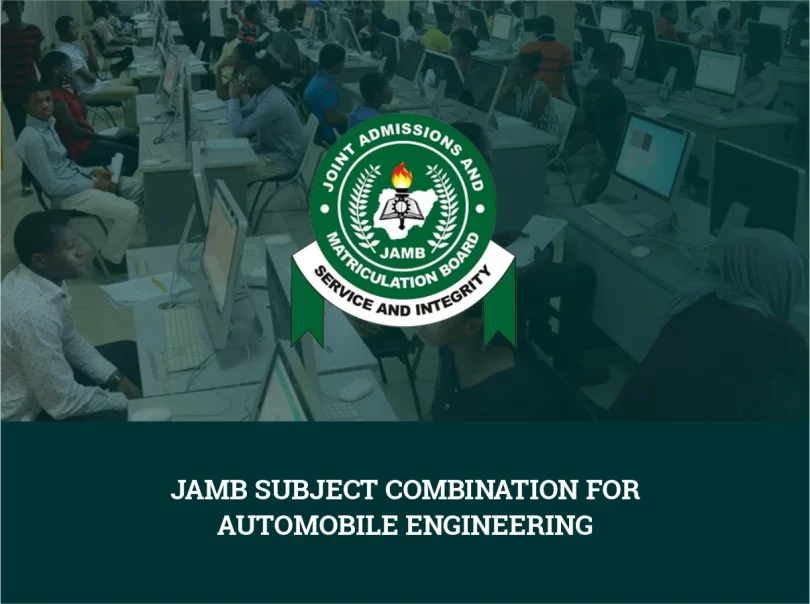Do you wish to study Automobile Engineering at a higher institution? Are you yet to register for JAMB, and you want to select Automobile Engineering as your course of study? If yes, you must first of all know the subjects to choose that will make you eligible for admission into the program.
UTME candidates aspiring to study Automobile Engineering are required to select four subjects during their JAMB registration; these subjects must be related to Automobile Engineering. Choosing an incorrect JAMB subject combination for Automobile Engineering may lead to a failed admission. You must make your choice rationally to be enhance your chances of gaining admission.
If you are interested in knowing the right JAMB subject combination required for studying Automobile Engineering, you are on the right page, where you will find information regarding the correct JAMB Subject combination for Automobile Engineering and other vital information. Read below for detailed information.
What is the Appropriate JAMB Subject Combination for Automobile Engineering?
To pursue a degree in Automobile Engineering through the Joint Admissions and Matriculation Board (JAMB) in Nigeria, it is essential to select the correct subject combination during your Unified Tertiary Matriculation Examination (UTME) registration. This ensures eligibility for admission into your desired course. The following subjects are the right JAMB Subject Combination for Automobile Engineering:
- English Language (Compulsory for all candidates)
- Mathematics
- Physics
- Chemistry
This combination is standard across most Nigerian universities offering Automobile or Automotive Engineering programs.
O’Level Requirements for Automobile Engineering
Candidates must possess at least five (5) credit passes in the following subjects. These credits should be obtained in not more than two sittings.
- English Language
- Mathematics
- Physics
- Chemistry
- Any other Science subject (e.g., Biology, Technical Drawing)
Direct Entry Requirements for Automobile Engineering
For candidates seeking admission through Direct Entry, the following qualifications are acceptable:
- A-Level passes in any two (2) of the following subjects: Mathematics, Physics, and Chemistry.
- National Diploma (ND) or Higher National Diploma (HND) in Mechanical Engineering or related fields with at least an upper credit.
Universities Offering Automobile Engineering
Abubakar Tafawa Balewa University (ATBU), Bauchi State
- Offers a dedicated Department of Automobile Engineering, structured to include periods of formal studies, industrial training, and projects tailored to meet the requirements of the field.
Bauchi State University, Gadau, Bauchi State
- Provides Automobile Engineering programs aimed at equipping students with practical and theoretical knowledge in the automotive field.
Federal College of Education (Technical), Akoka, Lagos State
- Offers Automobile Technology Education, affiliated with the University of Benin, focusing on grooming and producing teachers in technical, vocational, and commercial academic disciplines.
Important Note for Aspiring Candidates
The terms automobile engineering and automotive engineering are closely related, and in many contexts, they are used interchangeably. Automobile Engineering can sometimes be confused to be Automotive Engineering. However, there are subtle distinctions between the two, and concerned candidates should take note of the differences below:
Automobile Engineering
- Focus: Specifically deals with the design, development, and production of passenger vehicles, such as cars, buses, and trucks.
- Scope: Primarily concerned with the mechanical systems of these vehicles (e.g., engine, transmission, chassis, and suspension).
- Nature: Considered a sub-branch of automotive or mechanical engineering focused solely on road vehicles.
- Applications: Road transport vehicles only.
Automotive Engineering
- Focus: Broader field that includes all types of motor vehicles, including motorcycles, off-road vehicles, industrial vehicles, and increasingly, electric and autonomous vehicles.
- Scope: Covers mechanical, electrical, software, and safety engineering aspects.
- Nature: An interdisciplinary field combining mechanical, electrical, electronics, and computer engineering.
- Applications: Road vehicles, heavy machinery, off-road, and specialized transport systems.
We hope this article has been of great help to you. Let us know your thoughts in the comment section below.







Leave a Comment